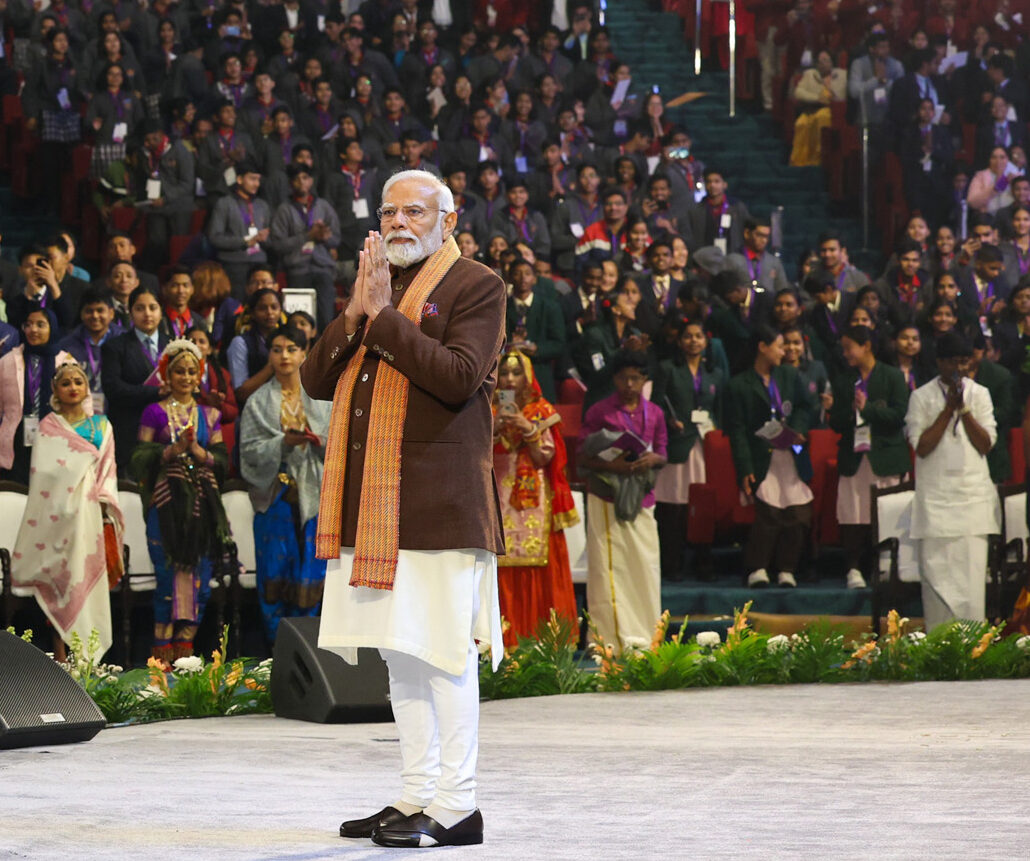The News Freedom
New Delhi, January 29
Prime Minister Narendra Modi, in his insightful address at the Pariksha Pe Charcha event, drew a thought-provoking analogy between technology and food, urging the audience to find balance in their mobile phone usage. He likened excessive phone use to overindulging in home-cooked meals – even though nutritious, too much can lead to issues. The key, he emphasized, lies in using technology effectively and wisely, guided by sound judgment.
He also recognized the parental dilemma surrounding privacy and technology in the age of smartphones. His suggestion: establish family rules, like gadget-free dinners and designated no-gadget zones. While acknowledging the inevitable presence of technology in today’s world, Modi stressed the importance of learning its effective use, viewing it not as a burden, but as a necessary skill.
In an interesting twist, he encouraged students to become technology educators for their parents, showcasing its potential as an educational resource. To foster transparency and trust, he even recommended sharing family phone passcodes, adding, “This could prevent a lot of evils.”
Beyond phones, the Prime Minister Modi discussed screen time management tools and apps, recognizing the need for balance in digital consumption. He further highlighted the educational potential of mobile phones in the classroom, leaving students with a message of mindful technology integration for learning.
The Prime Minister’s address at Pariksha Pe Charcha offered valuable insights not just for students preparing for exams, but for anyone navigating the ever-evolving landscape of technology. His key takeaways – find balance, use wisely, educate and involve – provide a roadmap for building a healthy relationship with our digital companions, one that empowers, informs, and connects, without overshadowing the richness of real-world experiences
At the Pariksha Pe Charcha event, Prime Minister Modi engaged students, teachers, and parents in a captivating session filled with inspiration and wisdom.
He began by highlighting the student-created exhibits, praising their expression of aspirations and concepts like the New National Education Policy. These displays, he said, offer a window into the minds of the new generation, brimming with ideas and solutions.
Next, the Prime Minister shifted focus to the significance of the venue, Bharat Mandapam. He explained its role in hosting the recent G20 summit, where world leaders discussed the future, inviting students to ponder the responsibilities and pressures borne by a Prime Minister. He acknowledged their understanding of these demands, noting that everyone encounters unforeseen challenges throughout life.
His approach to tackling these challenges resonated deeply. Instead of succumbing to avoidance, he declared, “I challenge every challenge.” This proactive stance allows him to learn from every situation, enriching his experience and empowering him to face new frontiers.
Drawing strength from the vast potential of his nation, PM Modi shared, “I have 140 crore countrymen with me. If there are 100 million challenges, there are billions of solutions.” He feels a profound connection to his people, recognizing their capabilities as his own. This collective strength drives his mission to empower them, believing that their progress fuels his ability to overcome challenges.
He expressed a clear vision for poverty eradication, stating, “When the poor themselves decide to remove poverty, poetry will go away.” His focus lies on providing them with the tools to dream – pucca houses, toilets, education, healthcare, and clean water. By unshackling them from daily struggles, he believes they will pave the way for a future free from poverty. In fact, he proudly emphasized that 25 crore people have escaped poverty during his tenure.
Prioritizing tasks also emerged as a crucial point. Through experience and careful analysis, the Prime Minister has honed his ability to discern what matters most. He views even mistakes as valuable lessons, offering opportunities for growth. He cited the Covid pandemic as an example, where instead of yielding to its force, he mobilized the nation through collective actions like lighting diyas and clapping thalis. Similarly, celebrating sporting triumphs and implementing the right strategies have contributed to India’s recent successes on the international stage.
For effective governance, he stressed the need for a seamless flow of information from the grassroots to the top and clear guidance in return. This two-way communication is vital for informed decision-making and responsive leadership.
The Prime Minister ended by urging everyone to embrace unwavering optimism. “I have shut all doors and windows of disappointment in my life,” he declared, highlighting the power of positive thinking in navigating even the most daunting situations. He encouraged all students to pursue their life goals with unwavering conviction, confident in their ability to achieve their dreams.
Join Pariksha Pe Charcha! Great to connect with students from across the country. https://t.co/VtScC14nVz
— Narendra Modi (@narendramodi) January 29, 2024
